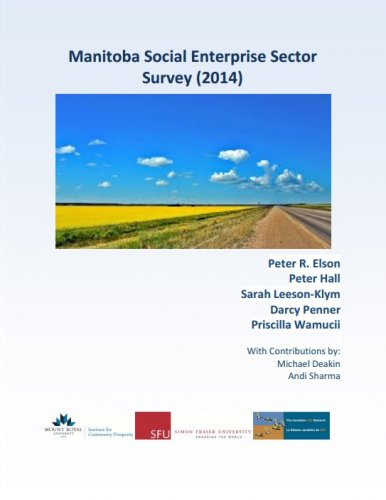This survey is the second profile of social enterprises in Manitoba, building on the previous report survey completed in 2011.
Social enterprises work in communities to achieve training, income, social, cultural, and environmental missions. They contribute to local economies and growth while striving to address social inequalities. In this study, a social enterprise was defined as a business venture owned or operated by a non‐profit organization that sells goods or provides services in the market for the primary purpose of creating a blended return on investment, both financial and social/environmental/cultural. A further selection criterion was that the social enterprise must, when possible, be independently verified as a social enterprise.
Download the Full 2014 Manitoba Social Enterprise Sector Survey Report
Download the 2014 Survey Highlights
The findings in this report cannot be considered a definitive reflection of all social enterprise sector activity in Manitoba. This is due to two factors. First, not all responding social enterprises provided complete financial data and our financial analysis was restricted to those that did. Second, the response rate, although excellent for a survey of this type, does not allow us to predict what the remaining non‐responding social enterprises would have reported, had they done so.
2014 Survey Findings at a Glance
In 2013, the 125 responding enterprises in Manitoba reported to have generated at least $63.6 million in revenues, including at least $49.3 million in sales. They paid at least $34.4 million in wages and salaries to at least 4,480 fulltime, parttime, seasonal or contract workers. They also trained 8,350 people, provided services to over 730,000, and involved 6,840 volunteers.
Table of Contents
INTRODUCTION
Overview and Purpose
What is a social enterprise?
SUMMARY OF THE FINDINGS
History of Community Economic Development in Manitoba
The Manitoba Social Enterprise Ecosystem
Provincial Government Support
Community Support
Financial Support
Manitoba Social Enterprise Strategy (MSES)
DATA NOTES AND METHODOLOGY
Creating the Catalogue
Questionnaire
Data Treatment and Management
Outliers
ORGANIZATIONAL PROFILE
Purpose and Mission Profile
Organization Structure
Relationship with Parent Organization
Sectors of Operation
Groups Served
Employment
Membership
ORGANIZATIONAL ANALYSIS
Age of the Social Enterprises
Areas of Focus
Poverty Focus
Training
Social Enterprises and Employment
Relationship with Parent Organization
FINANCIAL PROFILE
Financial Results
Sources of Finance
Strengths and Challenges of Manitoba’s Social Enterprises
CONCLUSION
Appendix A: Key Points of Comparison‐Purpose
Appendix B: Distribution Tables
Appendix C: Provincial Comparisons
Appendix D: Business Sector Classification
Appendix F: Questionnaire
Source
Theme





